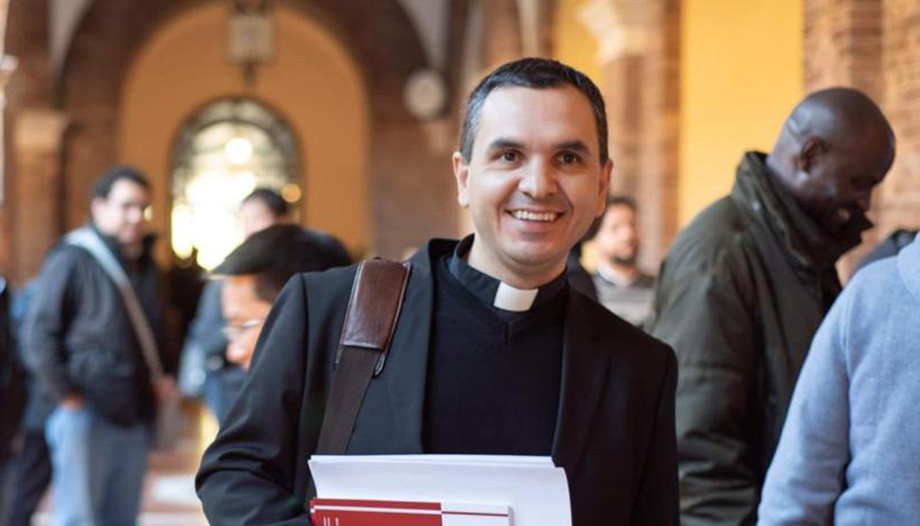Upon reading the recent letter of Pope Francis to the People of God on the liturgy, entitled "Desiderio desideravi", Professor Pietro Angelo Muroni, dean of theology at the Pontifical Urbaniana University, author of numerous books on faith and spirituality and priest of the Diocese of Sassari, was certain that the importance of this document lies in the fact that it is not addressed only to the ecclesiastical hierarchy: "It affects - he says - the entire People of God, because liturgical formation must concern everyone, it must involve everyone. The Pope says it: the liturgy is the fundamental dimension for the life of the Church". So much so, Don Muroni explains, that the letter "does not want to be a treatise on liturgical theology, it does not want to have an academic slant. Instead, the Pope wants it to be an element of reflection to contemplate the beauty and truth of the Christian celebration".
Professor, so the Pope is calling the people of God to return to the true essence of the liturgy?
- Indeed. The Pope calls the people of God to return to the spirit of the liturgy, as the theologian Romano Guardini would define it. Not long ago, the Pope received in audience the members of the Pontifical Liturgical Institute on the occasion of the 60th anniversary of its foundation and told them: beware when the liturgy becomes a battlefield for questions that are not essential or even obsolete. For this reason, the Pontiff, faced with the danger of spiritual worldliness, which he also dealt with in his first apostolic exhortation Evangelii GaudiumThe President wants to urge us all to consider the integrity of what we are celebrating.
What are the other important elements of this document?
- In the first place, it is insisted that the liturgy is the Work of God, in which God involves man. Point number 7 of the Sacrosanctum Concilium says: in this great work, in which God, through the rite, reaches man in order to save him, Christ unites his Church, his bride. Therefore, it is God who reaches out to us but, at the same time, God involves the Church. Another important element of the document is precisely the invitation to rediscover the beauty of the liturgy. In this sense, already in the Evangelii GaudiumPope Francis had underlined the fact that the Church evangelizes - and evangelizes herself - with the beauty of the liturgy.
What does the document mean when it talks about beauty?
- A beauty, the Pope explains in the letter, that is not the search for aestheticism, for beautiful forms. Although, undoubtedly, the liturgy must be beautiful, it must not be neglected. The continual rediscovery of the beauty of the liturgy means the rediscovery of the beauty of the mystery of Christ celebrated in the liturgy. We must come to be moved by the liturgy, which means going beyond the mere observance of rules and norms.
Is incarnation another important element?
- Yes, because the incarnation is the theological foundation of the Christian faith, but also of the entire liturgy. That is to say, the liturgy is not disembodied; the liturgy is expressed through the humanity of man and is also expressed through gestures, attitudes, signs and symbols that are part of man's life.
It is beautiful what the Sacrosanctum Concilium in number 83: Christ, by assuming human nature, brought to this land of exile that song which is sung eternally in the heavenly places. Christ's incarnation becomes the bond by which we unite ourselves to Him in order to unite ourselves to the Father and to the heavenly Church.
Does the document also delve into the rediscovery of the meaning of mystery?
- Of course it is. The Pope asks us to be careful with the smoky expression 'sense of mystery'. Sometimes, the Pontiff points out, the liturgical reform of the Second Vatican Council is accused of having eliminated the sense of mystery in the celebration. But what is the mystery for us? Pauline literature explains to us that the mystery of God is Christ, Christ himself who revealed the Father.
It is obvious, therefore, that the liturgy for us remains transcendent, man can never penetrate deeply into what is celebrated in the liturgy. But Christ also came through the liturgy, through the sacraments, to reveal himself, not to hide himself. The liturgy reveals the mystery and opens us to the presence of Christ in his Word, in the Eucharistic species, in the priest, in the people of God.
The letter also mentions training. Why is this important?
- If there is no liturgical formation, one cannot understand with the heart what is being celebrated. If I do not understand what I am doing in the liturgy, it is difficult for me to respect it. Formation is essential, especially in seminaries. I fear that certain drifts, such as Pelagianism and Gnosticism, that creep into the liturgy also depend on a lack of formation. If we educate future priests well in the true sense of the liturgy, we will have, as a consequence, laity formed in the true sense of the liturgy. On the contrary, we will have priests who live the liturgy as something to be done. As the Pope says in this letter, we must be formed for the liturgy, but also be formed with the liturgy.









